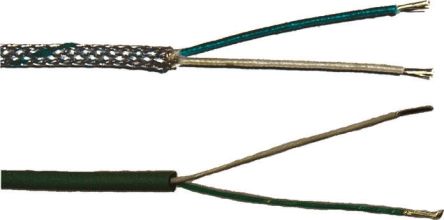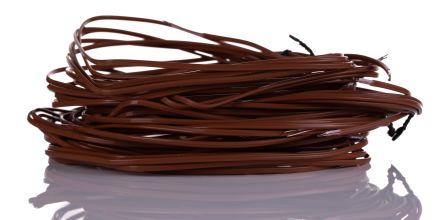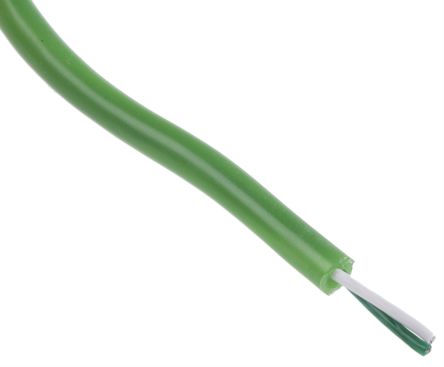- Automation & Control Gear
- Cables & Wires
- Enclosures & Server Racks
- Fuses & Circuit Breakers
- HVAC, Fans & Thermal Management
- Lighting
- Relays & Signal Conditioning
- Switches
- Batteries & Chargers
- Connectors
- Displays & Optoelectronics
- ESD Control, Cleanroom & PCB Prototyping
- Passive Components
- Power Supplies & Transformers
- Raspberry Pi, Arduino, ROCK, STEM Education & Development Tools
- Semiconductors
Thermocouple & Extension Wire
Thermocouple extension wires are specialised cables used to extend the distance between a thermocouple probe and the measuring instrument. They're designed to maintain the integrity of the thermocouple signal, ensuring accurate temperature readings even over long distances.
Thermal coupling wires are essential in industrial and scientific settings where the thermocouple probe might be located in a harsh or inaccessible environment, or where the measuring instrument needs to be placed at a safe distance.
Thermocouples are temperature sensors which measure temperature in a unique way across many industrial applications. A detailed explanation of Thermocouples can be found in our Thermocouples guide.
Thermocouple Extension Wire is used to create a hardwearing connection between the thermocouple probe to a readout instrument and is used to extend a thermocouple signal back to the instrument. At RS, we have many types of thermocouple extension wires suitable for different types of Thermocouples such as:
- J
- K
- L
- N
- R/S
- RTD
- S
- T
It is important to note that different thermocouple types (e.g. K or S type thermocouple wire) use different mixtures of metals in the cable.
What are Thermocouple Extension Wires Made From?
Thermocouple extension wire is made from a lower grade of wire than that used in thermocouple probes, so is more economical when used at length. It's typically made with colour-coded (usually PVC) insulation applied to each wire leg.
The negative lead is usually insulated in red and the positive lead is the colour of the thermocouple. For added durability and flexibility, a metal overbraid is applied to the insulated wire. For PVC wire this is a tinned copper overbraid, and for PFA it's stainless steel. This added layer protects the wire against abrasion.
The material used in the insulation of thermocouple extension wire significantly impacts its performance in various environments. PVC (Polyvinyl Chloride) insulation is ideal for general-purpose applications due to its flexibility and resistance to moisture, chemicals, and abrasion. However, it is limited to lower temperature environments.
PFA (Perfluoroalkoxy), on the other hand, offers superior performance in high-temperature situations, providing excellent chemical resistance and durability under extreme conditions. This makes it suitable for harsh industrial environments.
For even higher temperature resistance, fibreglass insulation is used, which can withstand temperatures far beyond the capabilities of PVC and PFA. Fibreglass also provides enhanced mechanical strength, making it ideal for applications where the thermocouple wire might be exposed to rough handling or mechanical stress.
Why Use Thermal Coupling Wires?
This extension grade wire is used to extend a thermocouple signal from a probe back to the instrument reading the signal. Thermocouple Extension Wire generally has a lower ambient temperature limit than a thermocouple, therefore it can pass a higher temperature signal as received from the probe, however the wire element cannot be physically exposed to higher temperatures.
Exceeding these temperature limits can result in signal degradation, leading to inaccurate readings or even damage to the wire itself. Therefore, operating within the prescribed temperature range is crucial to maintaining the integrity and accuracy of the thermocouple system over time.
Thermocouple Extension Wire is effective for extension purposes in Thermocouple applications, although Thermocouple Extension Wire may not be used in the probe part of the thermocouple. Selecting the appropriate extension wire type with the right temperature rating ensures consistent and reliable performance, safeguarding the accuracy of temperature measurements in critical applications.
Browse our broad range of Thermocouple Extension Wire offers and order today for next day delivery.
Thermocouple Wire Installation Best Practices
Proper installation of thermocouple extension wire is vital to ensure accurate temperature readings and prevent signal interference. Here are some key guidelines to consider before you buy a thermocouple extension wire:
- Handling: Handle the wire with care to avoid kinks, bends, or damage to the insulation. Sharp bends can alter the wire's thermoelectric properties and lead to inaccurate readings.
- Insulation: Ensure proper insulation throughout the thermocouple extension wire's length to prevent electrical shorts and signal noise. Use appropriate insulation materials based on the operating environment and temperature range.
- Protection: Protect the thermocouple extension wire from physical damage, abrasion, and harsh chemicals. Use conduit, cable trays, or other protective measures as needed.
- Routing: Avoid routing the thermal coupling wire near sources of electromagnetic interference (EMI), such as power cables, motors,or transformers. EMI can disrupt the thermocouple signal and lead to inaccurate readings.
- Grounding: Properly ground the thermocouple system to minimise electrical noise and ensure accurate measurements.
- Connections: Use appropriate connectors and terminals designed for thermocouple applications. Ensure secure and tight connections to prevent signal loss or degradation.
- Calibration: Periodically calibrate the thermocouple system to ensure accuracy and reliability.
Industry Applications
Thermocouple extension wires and thermocouple compensating cables are used across a range of industries in Australia for temperature measurement and control.
- Discrete Manufacturing: Monitoring temperatures in ovens, furnaces, and other heat treatment processes to ensure product quality and consistency.
- Process Manufacturing: Measuring temperatures in chemical reactors, distillation columns, and other process equipment to optimise production and safety.
- Energy & Utilities: Monitoring temperatures in power plants, boilers, and turbines to improve efficiency and prevent equipment failure.
- Facilities & Intralogistics: Measuring temperatures in HVAC systems, cold storage facilities, and other building systems to maintain comfort and safety.
Your Trusted Thermocouple Wire Supplier & Manufacturer
RS is a trusted and widely-used supplier and distributor of thermocouple extension wire in Australia. We offer a vast selection of high-quality wires from leading brands like Jumo, RS PRO, Electrotherm, and more.
If you are wondering about why you should buy thermocouple extension wires from us, some of the benefits of choosing RS Australia for your thermocouple extension wire needs include:
- Extensive Product Range: Access a wide variety of thermocouple extension wires to suit any application, from industrial processes to laboratory research.
- Quality Assurance: Source products from reputable manufacturers, ensuring reliability and accuracy in temperature measurement.
- Technical Expertise: Receive support from our knowledgeable team to help you choose the right wire for your specific needs.
- Fast and Reliable Delivery: Benefit from our efficient logistics network to get your products quickly and on time.
- Competitive Pricing: Take advantage of our competitive pricing and bulk discounts to save on your purchases.
When it comes to thermocouple and extension wire, RS Australia is your one-stop distributor for quality, selection, and service. Trust us to provide the components you need to ensure accurate temperature measurement and control in your operations. For delivery details on thermal coupling wire orders, please refer to our Delivery Page.
Popular Searches
Related links
- RS PRO Type K Thermocouple Cable/Wire Unscreened +350°C Max, 1/0.315mm
- RS PRO Type K Thermocouple Cable/Wire Unscreened +260°C Max, 1/0.3mm
- RS PRO Type K Thermocouple Cable/Wire Unscreened +260°C Max, 1/0.2mm
- RS PRO Type K Thermocouple Cable/Wire Screened +105°C Max, 7/0.2mm
- RS PRO Type T Thermocouple Cable/Wire Unscreened +200°C Max, 7/0.2mm
- RS PRO Type K Thermocouple Cable/Wire Unscreened +260°C Max, 7/0.2mm
- RS PRO Type K Thermocouple Cable/Wire Extension Lead Unscreened...
- RS PRO Type J Thermocouple Cable/Wire Screened +105°C Max, 7/0.2mm



